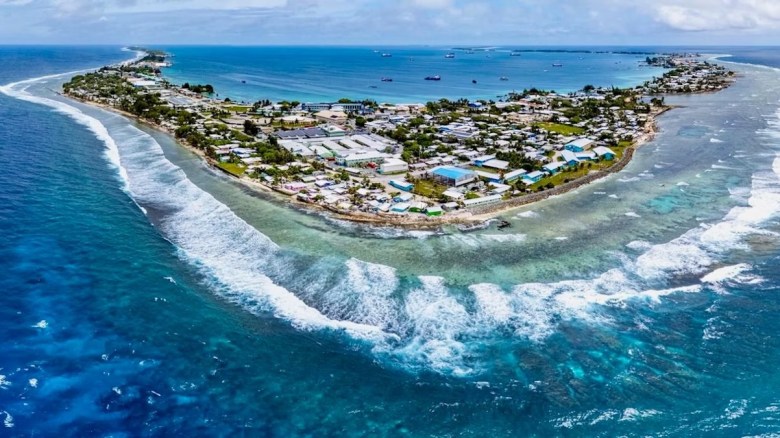Top Stories
Global Climate Goals Advance Despite Trump Administration’s Stance

In a significant development for global climate action, numerous countries have announced new and ambitious climate commitments, even as the Trump administration continues to undermine international efforts. The announcements followed a high-level summit where over 100 nations, including major emitters like China, set forth plans to combat climate change despite pressure from the U.S. to retract commitments.
The Marshall Islands, situated just 2 meters above sea level, exemplify the urgent threat posed by climate change. Increasing sea levels and severe weather events threaten not only the inhabitants but also the economic stability of the region. As rising temperatures lead to coral bleaching and disrupt ecosystems, the stakes for low-lying nations are alarmingly high. Studies indicate that if global greenhouse gas emissions are not significantly reduced, many such islands could become uninhabitable within decades.
After three decades of international climate negotiations, the situation remains precarious. Greenhouse gas emissions reached record highs in 2024, coinciding with the hottest year ever recorded on Earth. According to global climate studies, the need for urgent action is more pressing than ever to avoid catastrophic temperature increases.
Amid this backdrop, the Trump administration’s approach to climate change has drawn criticism. President Donald Trump has openly dismissed climate concerns, labeling them a “con job” during his address to the United Nations on September 23, 2025. His administration has sought to roll back climate regulations and has even threatened sanctions against countries that support international climate agreements. Nevertheless, many nations remain committed to their climate goals.
Notably, China, the world’s largest greenhouse gas emitter, received praise for achieving its renewable energy targets five years early. President Xi Jinping announced a commitment to reduce net greenhouse gas emissions by 7% to 10% from peak levels by 2035. This pledge includes plans to nearly triple solar and wind power capacity, showcasing a significant shift in China’s climate strategy towards absolute emissions reductions.
Similarly, the European Union indicated its intent to commit to a 66% to 72% reduction in net greenhouse gas emissions by 2035 compared to 1990 levels. This commitment aligns with the EU’s ongoing efforts to enhance renewable energy production, particularly in light of energy security concerns following Russia’s invasion of Ukraine. The EU has also announced its Carbon Border Adjustment Mechanism, set to begin in January 2026, which will impose costs on imported goods based on their carbon emissions.
Countries like the United Kingdom, Australia, and Japan have also made ambitious pledges aimed at achieving net-zero emissions by 2050. Despite internal challenges, such as Queensland’s decision to extend coal power plant operations, Australia remains focused on expanding renewable energy sources and fulfilling its climate targets.
In addition, several developing nations have stepped up their commitments. Brazil aims for a net emissions reduction of 59% to 67% by 2035 while maintaining its net-zero target for 2050. Nevertheless, the Brazilian government has faced scrutiny for its controversial oil exploration projects near the Amazon.
While the new commitments signal progress, the global response to the Trump administration’s stance reveals a complex interplay of ambition and self-interest. Some nations have criticized those lagging in their climate commitments, highlighting the disparities in progress. Notably, countries like Qatar and Argentina have yet to update their pledges, raising concerns about their commitment to the global climate agenda.
The forthcoming COP30 climate talks, set to take place from November 10 to 21, 2025, in Brazil, may provide a platform to advance a new framework for international climate commitments. Brazil’s proposal for a “globally determined contribution” aims to establish collective targets that could enhance accountability and cooperation among nations.
As the world grapples with the escalating impacts of climate change, the recent summit outcomes demonstrate a crucial moment for international cooperation. The contrasting approaches of nations underscore the urgent need for collective action to meet the challenges posed by climate change and secure a sustainable future for all.
-

 Lifestyle3 months ago
Lifestyle3 months agoHumanism Camp Engages 250 Youths in Summer Fest 2025
-

 Sports3 months ago
Sports3 months agoDe Minaur Triumphs at Washington Open After Thrilling Comeback
-

 Business3 months ago
Business3 months agoKenvue Dismisses CEO Thibaut Mongon as Strategic Review Advances
-

 Sports3 months ago
Sports3 months agoTupou and Daugunu Join First Nations Squad for Lions Clash
-

 Top Stories3 months ago
Top Stories3 months agoColombian Senator Miguel Uribe Shows Signs of Recovery After Attack
-

 World3 months ago
World3 months agoASEAN Gears Up for Historic Joint Meeting of Foreign and Economic Ministers
-

 Business3 months ago
Business3 months agoOil Prices Surge Following New EU Sanctions on Russia
-

 Entertainment3 months ago
Entertainment3 months agoDetaşe-Sabah Violin Ensemble Captivates at Gabala Music Festival
-

 Health3 months ago
Health3 months agoNew Study Challenges Assumptions About Aging and Inflammation
-

 Entertainment3 months ago
Entertainment3 months agoBaku Metro Extends Hours for Justin Timberlake Concert
-

 Business3 months ago
Business3 months agoU.S. House Approves Stablecoin Bill, Sends to Trump for Signature
-

 Top Stories3 months ago
Top Stories3 months agoRethinking Singapore’s F&B Regulations Amid Business Closures









